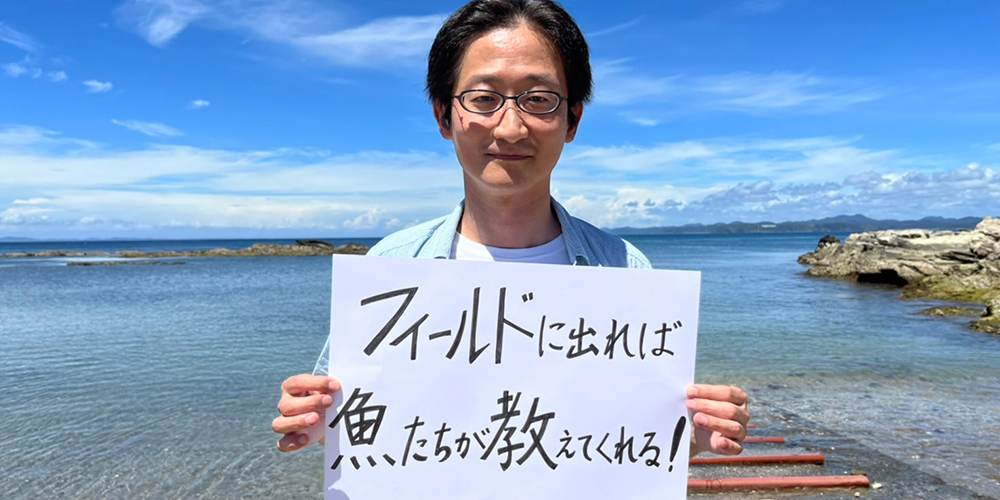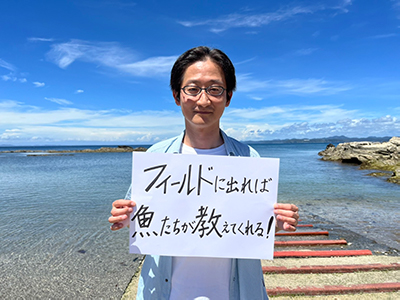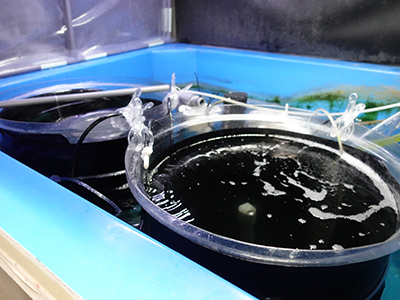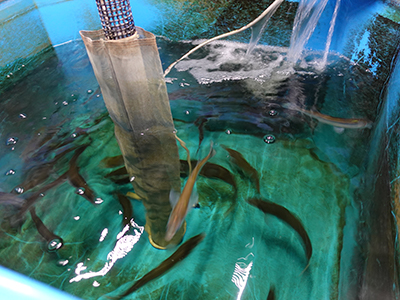People who convey voices from the sea
People who convey voices from the sea

Receiving alarm bells emitted by wild fish and providing feedback to society
Faculty of Marine Life Science Department of Marine Bioresources Yoji Yamamoto Associate Professor
emitted by wild fish
take the alarm
give feedback to society
Faculty of Marine Life Science Department of Marine Bioresources Yoji Yamamoto Associate Professor

Biography
Hirotsugu Yamamoto(Yoji Yamamoto)
Academic Assembly Division of Marine Bioresources Associate Professor
- Q What department do you belong to?
↓
- We educate and research "life science" and "resource biology" for creatures that live in water (aquatic organisms).Specifically, there are lectures where you can learn about these organisms from the genetic level to the level of cells, individuals, herds, and ecosystems, as well as lectures where you can learn about the relationship between each organism and the environment.In addition, there are ample field training and experiments to further deepen what you have learned.Through these lectures, practical training, and experiments, we aim to acquire methods and ways of thinking for using these while protecting aquatic organisms.
- Q What kind of classes do you teach?
↓
- I am in charge of biology, which is a basic subject for first-year students, and group biology practice for third-year students.In the practical training on population biology, students actually stayed for a week at the Hydrosphere Field Education Center on the beach in Tateyama City, Chiba Prefecture. We will learn and analyze various techniques.
- Q What kind of research are you doing?What do you find interesting about that research?
↓
- We are investigating the effects of various human-induced environmental stresses such as global warming, climate change, and marine pollutants on the reproductive mechanisms of wild fish.Using sardines, which are particularly sensitive to environmental changes, as an indicator species, we actually go to fields around the world to conduct capture surveys and investigate what kind of abnormalities there are.
We conduct field surveys together with researchers not only in Japan but also in South America and North America. and exciting.Sometimes fish that I've seen at a tropical fish store are caught in the net, and sometimes it's completely empty.
In addition, if an abnormality is found in the reproductive mechanism of the surveyed species, we will conduct breeding experiments under various environmental stress conditions in the laboratory to identify the cause.Since we focus on larvae and juveniles immediately after hatching, we start by catching parent fish during the breeding season and obtaining fertilized eggs through artificial insemination.Long-term rearing of larvae and juveniles of fish species for which rearing methods have not been established at all presents many challenges, such as securing food and mass mortality for unknown reasons. We will solve them one by one.When the results obtained in the field are verified in the lab and our hypothesis is proven as a result, I feel the excitement of research.
On the other hand, I am researching whether there are abnormalities in the reproductive mechanism of wild fish, so "the hypothesis is proven" = "there are abnormalities in fish and the cause has been identified."I believe that I have a role to play in receiving the warning bells emitted by wild fish and informing society in an easy-to-understand manner.


- Q What inspired you to do this research?Please tell us about the episodes that you fell in love with, the episodes that lead to your current research, etc.
↓
- Until now, it has been known that when newly born larvae are reared under various stress conditions in laboratories, abnormal reproductive mechanisms occur in various fish species.But do the phenomena that occur in captivity really occur in the wild?It all started with a simple question.
Therefore, I first thought of evaluating the adverse effects of high water temperature stress in the wild environment. You need to capture as manyActually this is very difficult.
For example, have you ever seen the freshly hatched larvae of the fish you usually see on your table in the wild?When it comes to spawning season, there should be freshly born larvae in the wild, but most of you have probably never seen them, regardless of what kind of fish they are.That's because they're really good at hiding from predators.
My research target species in Japan is the sardine sardine, which is a type of fish of the order Sardine. When I first started my research, I focused on analyzing adult fish, which are relatively easy to catch.However, one summer night, on the way back from a completely different project, I went to a small fishing port with the students of my laboratory to collect organisms. I found a lot of it piled up.In addition, when I put on my long body and went into the surrounding sea, I found many juvenile sardines with sleepy eyes in the seaweed, which I was able to easily catch with a net.
This accidental discovery made it possible to capture the necessary number of juvenile and juvenile larvae and juveniles of ginso sardines that were born each year (several hundred fish), and research progressed rapidly.I still can't forget the excitement I felt when my students and I discovered the larvae of the giant sardine on that summer night. - Q What number of SDGs is your research related to?How will your research help society?Also, what kind of occupation or work do you think it will lead to?
↓
- Together with students who love living creatures, I go out to sea every day, catch the target fish in the field, and conduct various physiological analyzes to understand the actual situation.By doing so, you can read the voiceless messages emitted by creatures living in the aquatic environment.
Recently, various phenomena that threaten ecosystems, such as global warming, climate change, and environmental pollutants, have become global problems.However, there are few people who can understand how badly it actually affects the creatures that inhabit the seas, rivers, and lakes in front of you.
I believe that scientifically deciphering the unspoken messages of living creatures that are exposed to various environmental stresses caused by human activities, providing feedback to society in an easy-to-understand manner, and sounding alarm bells is the key to "knowing the ocean, knowing the ocean." I believe that it is my important mission as a faculty member and researcher belonging to Tokyo University of Marine Science and Technology, whose motto is to protect the environment and use the sea.
- Q What are your future goals as a researcher?What kind of "dream" do you want to give to the world through your research?It doesn't have to be realistic.Please tell me your dream of becoming a teacher.
↓
- When I go out into the field every day and interact with fish, I make new discoveries regardless of size.Some discoveries can be submitted to major scientific journals, others not, and each one is unknown to the world.I would like to continue my research activities to "protect wild fish" while sharing these treasured discoveries with the students in my laboratory.
- Q: Looking ahead to 2030, what kind of research would you like to do with incoming students?
↓
- I love fieldwork, but it doesn't tell me what's happening to fish in the wild.In order to prove this, steady breeding tests in laboratories, endocrinological investigations such as hormone measurements, and molecular biological investigations such as genetic analysis are essential.
There are many students who like sea creatures and enter Ocean University.There are students who like fishing, students who like to catch waterside creatures, and some students who are not good at living creatures (laughs).In order to "protect wild fish" together with such students, I sometimes carried a net in the ocean, sometimes held a pipette in a laboratory, and immersed myself in research. I think it would be good if it leads to "protecting the ecosystem".
- QXNUMX.What made you decide to enroll?
↓
- I am a professor at the Department of Marine Bioresources at the University of Marine Science and Technology.
- QXNUMX.What was your school life like?Please tell us about a memorable episode.
↓
- From the 1990st grade to the XNUMXrd grade, I spent all my time fishing. Black bass fishing was at its peak in the early XNUMXs, so I used to go to Lake Kasumigaura in Ibaraki prefecture with many fishing rods.At night, I often went seabass fishing around the Shinagawa campus.
After joining the laboratory as a fourth-year student, I embarked on "research" for the first time under the theme of "elucidation of the ayu egg maturation mechanism."At that time, the Yamanashi Prefectural Fisheries Technology Center provided ayu for my research, but the experiments did not go as planned, and the autumn spawning season ended.At that time, the teacher who was teaching me at the time told me that the spawning season for sweetfish had ended in the Kanto region, but it hadn't ended yet in Kyushu, so I should fly to Nagasaki!I was sent to Nagasaki University for three months without knowing what to do.At this time, I learned that there is a time limit when using fish that have a spawning season for research.Also, I learned that footwork is important in research, as if there were no fish there, I would have to move.Of course, Nagasaki is a fishing paradise, so I took my fishing rod with me.I stayed up all night doing a culture experiment on sweetfish oocytes, and in my free time I went fishing for bigfin reef squid and cutlassfish with students from Nagasaki University.
I think I didn't sleep much at the time because I was balancing research and fishing, but those three months were a very fulfilling time because I was able to devote myself to what I liked without thinking about anything.I was overwhelmed with emotion when I was seconded to Nagasaki, where I was able to obtain the final piece that was essential to my research theme, "Elucidation of the egg maturation mechanism of sweetfish." - QXNUMX.Is there anything you would like to say to high school students who are wondering whether to take the entrance exam for Marine University?
↓
- If you like waterside creatures and fish, I think it's definitely a university.








